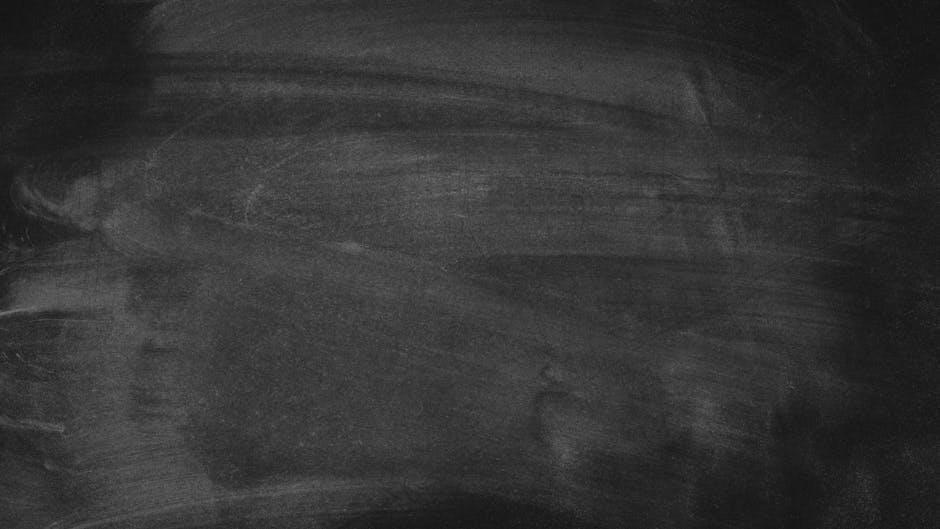simple examination of conscience pdf

An examination of conscience is a spiritual practice involving quiet reflection‚ prayer‚ and self-awareness to identify sins and prepare for confession. It uses guides like the Ten Commandments and Seven Capital Sins to foster sincerity and contrition.
Overview of Examination of Conscience
An examination of conscience is a reflective prayerful process to identify sins‚ weaknesses‚ and areas for spiritual growth. It involves reviewing actions‚ thoughts‚ and omissions against moral guidelines like the Ten Commandments and the Seven Capital Sins. This practice helps individuals acknowledge their failings‚ seek forgiveness‚ and grow in holiness. Regular examination fosters sincerity‚ accountability‚ and a deeper relationship with God‚ essential for meaningful confession and spiritual renewal.
Importance of Regular Self-Reflection
Regular self-reflection is crucial for spiritual growth‚ enabling individuals to recognize their sins and weaknesses. Through consistent examination‚ one gains insight into their moral state‚ fostering humility and contrition. It deepens their relationship with God‚ encourages personal accountability‚ and promotes a virtuous life. This practice helps to avoid complacency‚ leading to a more sincere and fruitful sacrament of confession‚ and ultimately‚ a deeper union with God through ongoing spiritual renewal and holiness.

Preparing for an Effective Examination of Conscience
Effective preparation involves setting aside quiet time for reflection and invoking the Holy Spirit through prayer. This practice helps clarify thoughts and feelings‚ fostering sincere contrition and a fruitful examination of conscience‚ essential for spiritual growth and a meaningful confession.
Setting Aside Time for Reflection
Setting aside time for reflection is crucial for an effective examination of conscience. Choose a quiet‚ distraction-free environment where you can focus on your thoughts and feelings. Dedicate a specific period‚ ensuring it is long enough to thoroughly reflect on your actions‚ sins‚ and attitudes. This practice helps cultivate self-awareness and sincerity‚ allowing you to approach confession with a humble and open heart. Regular reflection strengthens your spiritual life and deepens your relationship with God.
Prayer and Invocation of the Holy Spirit
Prayer is essential for a fruitful examination of conscience. Begin by invoking the Holy Spirit‚ asking for enlightenment to recognize your sins and for the grace to repent sincerely. Use specific prayers‚ such as the Act of Contrition or prayers from spiritual guides‚ to seek guidance. This practice helps clarify your thoughts‚ moves your heart toward contrition‚ and prepares you to approach confession with honesty and humility‚ fostering a deeper connection with God and His mercy.

Using the Ten Commandments as a Guide
The Ten Commandments provide a clear framework for examining conscience‚ helping identify sins against God‚ others‚ and self. Each commandment offers specific areas for reflection‚ ensuring a thorough review of actions‚ attitudes‚ and omissions‚ fostering accountability and spiritual growth through structured self-evaluation and preparation for confession.
Reflecting on Each Commandment
Reflecting on each commandment involves examining specific areas of life‚ such as respect for God‚ others‚ and self. This structured approach helps identify sins like dishonor‚ disrespect‚ or neglect of duties. By asking targeted questions related to each commandment‚ individuals can pinpoint failures and attitudes needing improvement. This method ensures accountability and fosters spiritual growth‚ guiding individuals toward a sincere and meaningful confession.
Identifying Specific Sins Related to Each Commandment
Identifying specific sins involves linking each commandment to particular actions or omissions. For example‚ asking if one has dishonored parents‚ lied‚ or stolen. This step helps recognize failures in love‚ respect‚ and obedience. By reflecting on each commandment‚ individuals can pinpoint sins like blasphemy‚ envy‚ or neglect of duties. This process ensures clarity and accountability‚ guiding individuals to seek forgiveness and amendment. Prayer and self-awareness are key to this fruitful examination.

Examining Sins Related to the Seven Capital Sins
Examining sins related to the Seven Capital Sins involves reflecting on pride‚ envy‚ and other vices. This practice helps identify personal failings for sincere contrition and confession.
Understanding Each Capital Sin
The Seven Capital Sins—pride‚ envy‚ anger‚ sloth‚ greed‚ gluttony‚ and lust—represent root tendencies toward sin. Each sin manifests in specific ways‚ such as pride through self-exaltation or envy through resentment. Reflecting on these vices helps identify how they influence thoughts‚ words‚ and actions. Understanding their nature enables a deeper recognition of personal failings‚ fostering sincere contrition and a commitment to spiritual growth. This awareness is crucial for a meaningful examination of conscience and confession.
Recognizing Personal Failings and Weaknesses
Recognizing personal failings and weaknesses involves acknowledging sins and shortcomings in daily life. This step requires honesty and self-awareness‚ often aided by reflection on the Ten Commandments or the Seven Capital Sins. Prayer and invocation of the Holy Spirit can enlighten the mind to identify specific areas needing improvement. Being specific about sins‚ rather than vague‚ ensures a deeper understanding of one’s spiritual state. This recognition is essential for genuine contrition and meaningful confession‚ fostering personal growth and a closer relationship with God.
The Purpose of Examination of Conscience
The purpose is to distinguish between mortal and venial sins‚ understand their gravity‚ and prepare for confession. It helps seek forgiveness‚ grow spiritually‚ and deepen one’s relationship with God.
Distinguishing Between Mortal and Venial Sins
Mortal sins are grave offenses that destroy the soul’s supernatural life‚ requiring confession for forgiveness. They involve grave matter‚ full knowledge‚ and deliberate consent. Venial sins‚ while harmful‚ do not break the relationship with God and can be forgiven through prayer or sacraments. Recognizing this distinction helps in understanding the severity of sins and preparing for confession‚ ensuring a deeper spiritual cleansing and growth.
Preparing for the Sacrament of Confession
Preparing for confession involves prayer‚ self-reflection‚ and honesty. Begin by invoking the Holy Spirit for guidance‚ then review your actions and intentions. Be specific about sins‚ acknowledging their gravity and impact on your relationship with God. Approach the sacrament with sincerity‚ ready to express contrition and seek forgiveness. This preparation ensures a fruitful confession‚ fostering spiritual healing and growth. Regular examination of conscience helps deepen this process‚ making confession a meaningful step toward reconciliation.
Common Mistakes to Avoid During Examination
Overlooking specific sins‚ being too vague‚ or neglecting certain attitudes hinder effective examination. Avoid superficiality and ensure thorough‚ honest reflection for genuine spiritual growth and contrition.
Being Too Vague or Superficial
One common mistake is being too vague during examination‚ failing to specify sins and their circumstances. Superficial reflection neglects deeper spiritual issues‚ preventing genuine contrition and growth. It’s important to avoid generalizing faults without detail‚ ensuring each sin is acknowledged clearly. This helps in understanding the gravity of actions and fosters sincere repentance‚ essential for a meaningful confession and spiritual progress. Clarity in examination leads to a more profound encounter with God’s mercy and forgiveness.
Neglecting Certain Sins or Attitudes
Neglecting specific sins or attitudes during examination hinders spiritual growth and true contrition. Overlooking lesser faults or rationalizing sinful behaviors leads to incomplete confession and unaddressed weaknesses. This oversight prevents full reconciliation and diminishes the sacrament’s effectiveness.
Using structured guides‚ like those based on the Ten Commandments or Capital Sins‚ helps ensure comprehensive reflection‚ reducing the likelihood of omitted sins. This thoroughness fosters accountability and sincerity‚ enabling a more profound encounter with God’s mercy and forgiveness.
Practical Tips for Making Examination a Habit
Set a regular schedule‚ like daily or weekly‚ to reflect on your actions and attitudes. Use structured guides or worksheets to maintain focus and ensure thoroughness.
Setting a Regular Schedule for Reflection
Consistency is key to making examination of conscience a habit. Choose a specific time each day or week‚ such as before bed or after prayer‚ to reflect quietly. Use a planner or app to schedule it‚ ensuring commitment. Start with short periods and gradually increase as it becomes routine. This practice fosters spiritual growth‚ helping you stay mindful of your actions and attitudes. Regular reflection also prepares you for meaningful confession and strengthens your relationship with God.
Using Guides or Worksheets for Structure
Utilizing guides or worksheets provides structure and clarity during examination of conscience. These tools often include questions or prompts based on the Ten Commandments or Seven Capital Sins‚ helping identify specific sins or attitudes. They save time and ensure thoroughness‚ preventing important areas from being overlooked. Many worksheets also include prayers or reflections to deepen contrition and focus the mind. Examples can be found in simple PDF formats‚ offering a clear and organized approach to spiritual preparation.

Prayer Before Confession
Prayer is essential to seek guidance and contrition. Specific prayers‚ like the Act of Contrition or St. Jerome’s prayer‚ help express sincere sorrow and enlightenment for confession.
Using Specific Prayers for Guidance
Specific prayers‚ such as the Act of Contrition or St. Jerome’s prayer‚ are powerful tools for guidance during confession. These prayers help seekers express sincere sorrow‚ seek forgiveness‚ and enlighten their minds. By invoking the Holy Spirit‚ individuals can gain clarity in identifying sins and fostering contrition. Prayers like these provide structure and depth to the examination process‚ ensuring a heartfelt and meaningful preparation for confession. They serve as a bridge between self-reflection and spiritual renewal‚ guiding individuals toward genuine reconciliation and growth.
Expressing Sincere Contrition
Expressing sincere contrition is a vital part of the examination of conscience. It involves heartfelt remorse for sins committed‚ prayerfully seeking forgiveness‚ and resolving to avoid future wrongdoing. Through specific prayers‚ such as the Act of Contrition‚ individuals can articulate their sorrow and express a genuine desire to change. This heartfelt expression fosters a deeper connection with God and paves the way for spiritual healing and renewal. Sincerity in contrition is essential for a meaningful and transformative confession.
Regular examination of conscience fosters spiritual growth and a deeper connection with God. It encourages ongoing reflection‚ accountability‚ and a commitment to continuous improvement in one’s faith journey.
Summarizing the Benefits of Examination
Regular examination of conscience offers numerous spiritual benefits‚ including greater self-awareness‚ clarity in identifying sins‚ and a deeper understanding of God’s mercy. It fosters accountability‚ encouraging individuals to take responsibility for their actions and attitudes. This practice also promotes sincere contrition‚ essential for meaningful confession. By reflecting on sins and weaknesses‚ individuals can grow in humility and virtue‚ ultimately strengthening their relationship with God and others. It serves as a powerful tool for ongoing spiritual renewal and personal growth.
Encouraging Ongoing Spiritual Growth
Regular examination of conscience fosters ongoing spiritual growth by promoting self-awareness and moral reflection. It helps individuals identify areas for improvement‚ develop virtues‚ and deepen their faith. Through prayer and reflection‚ one can overcome weaknesses and strengthen their relationship with God and others.
- This practice encourages a lifelong commitment to spiritual development‚ leading to personal and communal enrichment.
- It cultivates humility‚ gratitude‚ and a stronger sense of purpose‚ guiding individuals toward a more meaningful and faithful life.





